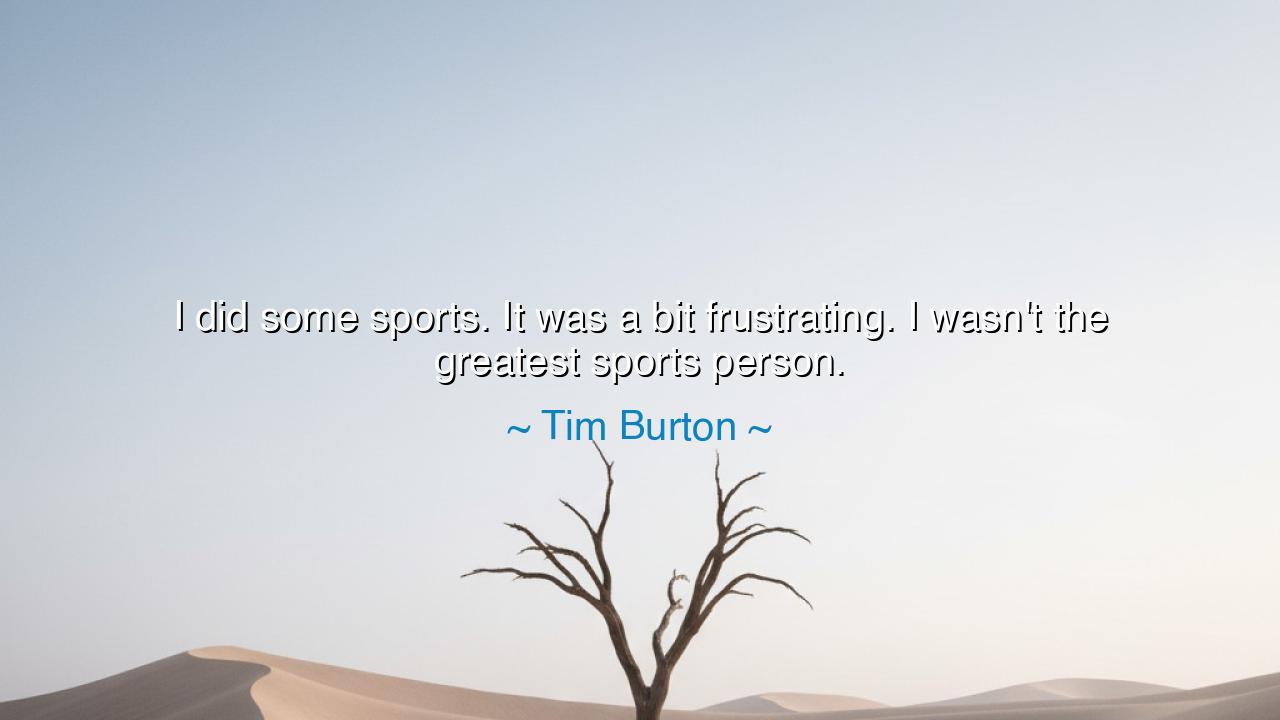
I did some sports. It was a bit frustrating. I wasn't the






In the words of Tim Burton, “I did some sports. It was a bit frustrating. I wasn’t the greatest sports person.” there is more than mere confession of childhood memory; there is a hidden mirror for the soul. These words, simple and unadorned, speak of the eternal struggle of the human spirit when placed in fields not suited to its gifts. In them echoes the truth that every soul is not forged for the same arena, and that frustration often precedes discovery of one’s truer path.
The ancients knew well that life is a battlefield where each must find the weapon suited to his hand. When Burton says he was “not the greatest sports person,” he reveals the clash between expectation and nature. Society often urges us toward contests of strength, speed, and skill, yet many spirits are not destined for glory in these pursuits. Some are warriors of vision, some are keepers of words, some are dreamers of shadows. To force a poet into the field of javelins, or a painter into the racecourse, is to invite sorrow and weariness.
And yet, frustration is not a curse but a teacher. It reminds us of our limits, yes, but it also whispers of new paths. Consider the story of Demosthenes, the great orator of Athens. As a youth, he was weak in body, awkward in speech, and mocked for his lack of strength. Yet from his failure to triumph in physical contests grew his fire for words. With stones in his mouth he practiced, with the roar of the sea he trained his voice, until his speeches shook the very assemblies of Greece. From what seemed a defect of nature arose a gift of immortal power.
Burton’s confession is thus not of weakness, but of transformation. He discovered that his gifts were not on the playing field, but in the realms of imagination. The frustration he felt became the fuel for his art, pushing him toward the strange, the haunting, and the beautiful worlds he would later bring to life. It is as though life itself whispered: “You are not meant to chase the ball, but to chase shadows; not to leap higher, but to dream deeper.”
To the listener of these words, let this be a lesson: do not despise your shortcomings. When you stand among others and feel out of place, remember that your worth is not measured in their contests, but in the fire of your own heart. If your hands tremble at the sword, perhaps they are meant for the pen. If your feet stumble on the track, perhaps they are meant to walk paths of thought unseen by others. The gods grant no soul without a gift; only men err when they measure gifts by the wrong standard.
Yet beware of surrendering too soon. Burton did some sports—he did not flee from them at once. To try, to stumble, to endure the sting of being “not the greatest,” is part of the wisdom of life. For in the furnace of trial we learn both our limits and our strength. You must taste defeat before you recognize victory in another form. Try many paths, and let frustration guide you, not destroy you.
So, the teaching is clear: honor your frustration, but follow it as a signpost, not as a prison. Seek the place where your spirit soars rather than sinks. In practice, this means: test many crafts, but listen to your heart’s quiet cry; reflect on where you feel most alive; nurture the soil where your roots take hold. The action to take is simple yet profound—try, fail, and redirect—until you find the arena where your soul becomes flame.
Thus, from Tim Burton’s modest confession shines a wisdom as old as time: that one’s true greatness may lie hidden not where we first stumble, but where our heart burns unquenched. Let every failure be a guide, and every frustration a doorway, until you discover the realm where your spirit is meant to triumph. For there, and only there, will your life be sung like the heroes of old.






AAdministratorAdministrator
Welcome, honored guests. Please leave a comment, we will respond soon